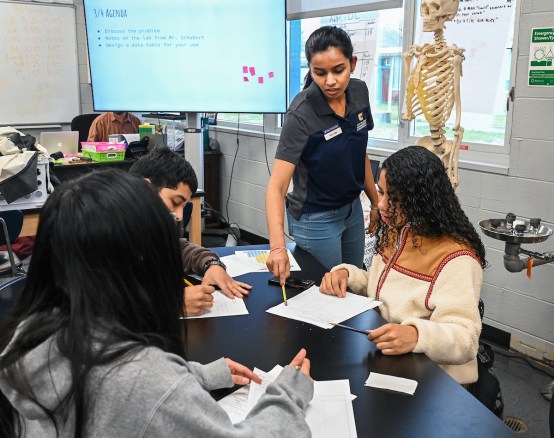
UTC’s Dr. Bradley Harris works with Brainerd High School students on Monday, Mar. 4, 2024. Photo by Angela Foster.
Fifty Brainerd High School students showed Dr. Bradley Harris the power of “problem-based learning” (PBL) and are the inspiration behind a winning proposal for a University of Tennessee System “Grand Challenges” grant.
Harris, associate professor and head of the University of Tennessee at Chattanooga Department of Chemical Engineering, is principal investigator for the proposal titled “Thermal runaway in EV batteries: A transformational PBL unit for high school chemistry.” Dr. Stephanie Philipp, assistant professor of education and director of the UTC STEM Education Program, is co-principal investigator.
The UT System Grand Challenges program funds proposals in one of three focus areas: strengthening rural communities, overcoming addiction and—the category of the winning UTC proposal—strengthening K-12 education.
Over eight months beginning in January 2025, the project will receive $96,812 for supplies, equipment, personnel compensation and transportation to and from UTC for as many as 120 Brainerd High chemistry students. That’s more than double the number of Brainerd students who participated in a January-May 2024 collaboration between UTC and Brainerd in the UL Research Institutes’ Xplorlabs engineering challenge that inspired this project.
In the Xplorlabs effort earlier this year, Brainerd high schoolers spent time with UTC chemical engineering faculty and students, learning about battery chemistry and safety hazards associated with lithium-ion batteries that can result in overheating—called “thermal runaway.”
The Brainerd students applied knowledge from their chemistry coursework to design an enclosure to protect batteries from overheating and prevent thermal runaway. From UTC chemical engineering faculty Brainerd students learned about careers in safety science and education pathways.
Ethan Schubert, a chemistry teacher and head of the science department at Brainerd High, reported that as a result of their experience, two students who hadn’t planned to attend college applied to UTC and Chattanooga State Community College to pursue engineering and mechatronics degrees. A third student changed their intended college major to engineering, and a fourth student applied for a job working with electric vehicles at the Volkswagen manufacturing facility in Chattanooga.
As noted in the recently funded proposal to replicate the approach on a larger scale, “The initial cohort consisted of 50 students, with 42 submitting final products in the form of an engineering design challenge. Students cited this unit as a reason for showing up in class on time, feeling as if they were able to reach science in a meaningful way and exploring post-secondary opportunities. Students were observed using unit content in their daily lives, and other students reported sharing the safety science with their families.”
When it begins in 2025, the project will serve as many as 120 Brainerd High students.
“We wanted to do this again, but bigger, and this funding gives the support needed to build the project up,” Harris said. “Along with that came two great additions: It lets me also bring in a STEM education expert like Dr. Stephanie Phillip, and Dr. Peng Zhao, a UT Space Institute associate professor and expert on thermal management in electric vehicle batteries.”
Zhao, an associate professor of mechanical, aerospace and biomedical engineering, will serve as a research expert on thermal management of electric vehicle batteries, give a guest lecture to the Brainerd students, and take them on a virtual (video) tour of the Laboratory of Advanced Mobility and Power (LAMP) at UTSI in Tullahoma. The tour will feature equipment and methods for battery electrochemical testing, material analysis and thermal runaway testing.
A third element Harris cited as further enriching the experience for participating Brainerd students: A former UTC engineering student now works in battery testing at Volkswagen and will host a visit by the high school students to its laboratory.
“There is a clear need for STEM curricula that involves engagement with local community partners and features scientific phenomena that are culturally relevant, engaging and evidence-based. Problem-based learning has been shown to increase student success, especially for those from disadvantaged backgrounds,” Harris wrote in the winning proposal. “Evidence also suggests that success outcomes increase significantly regardless of a student’s reading ability when participating in problem-based learning.”
In addition to meeting those needs, Harris said he believes the approach can be replicated nationally—another of the project’s stated goals. The project’s elements and process will be made fully available for replication by sharing on the curriculum platform www.teachengineering.org.
In addition, Harris plans to give a presentation on the approach and its outcomes at an upcoming conference of the American Society for Engineering Education.
“This is not about us going into a classroom and saying, ‘Every single one of you has to go into this career field,’ but it is about revealing opportunities to some students who might not realize them otherwise,” Harris said.
“And I definitely think that is something of our mission at UTC and, particularly, in our college, as well as something that sets us apart in this region.”
Learn more
UTC College of Engineering and Computer Science

UTC engineering faculty, staff and students, including Dr. Bradley Harris, worked with high school students Monday, Mar. 4, 2024, at Brainerd High School.



